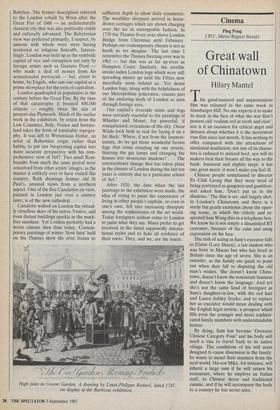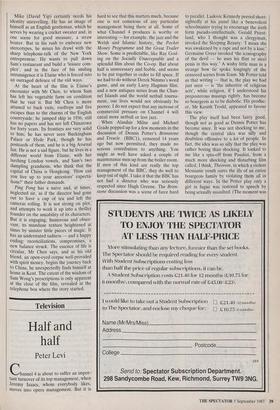Cinema
Ping Pong (PG', Metro Rupert Street)
Great wall of Chinatown
Hilary Mantel
This good-natured and unpretentious film was released in the same week as Hamburger Hill. No one expects it to make its mark in the face of what the war film's posters call 'realism red in tooth and claw'; nor is it an occasion for critical angst and debates about whether it is the more/most true film since last month. It has nothing to offer compared with the attractions of simulated mutilation; not one of its charac- ters is reduced to minced beef, nor will its makers beat their breasts all the way to the bank. Innocent and slightly inept, it has one great merit: it won't make you feel ill.
Chinese people complained to director Po Chih Leong that they were tired of being portrayed as gangsters and gamblers, and asked him, 'Don't put us in the shadows.' The film is set, and largely shot, in London's Chinatown and there is a seedy but gentle exoticism about the open- ing scene, in which the elderly and re- spected Sam Wong dies in a telephone box. We know he is not simply a dissatisfied BT customer, because of the calm and smug expression on his face.
The task of acting as Sam's executor falls to Elaine (Lucy Sheen), a law student who was born in Macao but who has lived in Britain since the age of seven. She is an outsider, as the family are quick to point out when they fall to disputing the old man's wishes. She doesn't know China- town, doesn't know the restaurant business and doesn't know the language. And yet she's not the same kind of foreigner as Sam's daughter-in-law, with the red hair and Laura. Ashley frocks; and to replace her as executor would mean dealing with the English legal system, a prospect which fills even the younger and more sophisti- cated family members with understandable horror.
By dying, Sam has become 'Overseas Chinese Category Four' and his body will need a visa to travel back to its native village. The conditions of his will seem designed to cause dissension in the family: he wants- to mend their manners from the next world. His son Mike, for instance, will inherit a large sum if he will return his restaurant, where he employs an Italian staff, to Chinese decor and traditional cuisine, and if he will accompany the body to a country he has never seen.
Mike (David Yip) certainly needs his identity unravelling. He has an image of himself as an English gentleman, which be serves by wearing a cricket sweater and, in one scene for good measure, a straw boater. But in his rush to embrace new stereotypes, he mixes his drawl with the sharp telephone-talk of the New York entrepreneur. He wants to pull down Sam's restaurant and build a 'leisure com- plex', and in the face of his smiling intransigence it is Elaine who is forced into an outraged defence of the old ways.
At the heart of the film is Elaine's encounter with Mr Chen, to whom Sam has left his vegetable farm on condition that he visit it. But Mr Chen is more attuned to back exits, rooftops and fire escapes than to the charms of the English countryside; he jumped ship in 1936, still has no papers and has not left Chinatown for forty years. Its frontiers are very solid to him; he has never seen Buckingham Palace or Hyde Park, though he has postcards of them, and he is a big Arsenal fan. He is not a sad figure, but he lives in a different world from Elaine, with her lurching London vowels, and Sam's two dumpling grandsons, who think that the capital of China is Hongkong. 'How can you live up to your ancestors' expecta- tions?' their father demands.
Ping Pong has a naive and, at times, neglected air, as if the director had gone out to have a cup of tea and left the cameras rolling. It is not strong on plot, and attempts to work it up into a thriller founder on the amiability of its characters. But it is engaging, humorous and obser- vant, its mundane texture heightened at times by sinister little pieces of magic. It has an understated sadness — and a happy ending: reconciliations, compromises, a new balance struck. The essence of life is circular, Mr Chen says, and as his old friend, an open-eyed corpse well-provided with spirit money, begins the journey back to China, he unexpectedly finds himself at home in Kent. The extent of the wisdom of Sam Wong's prescriptions is only apparent at the close of the film, revealed in the telephone box where the story started.



















































 Previous page
Previous page